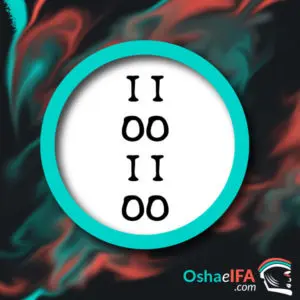Oshe Ogunda (Oshe Omolu)

Oshe Ogunda (Oshe Omolu), is the sign number 235 in the Lordly Order of Ifa, reveals a path of obstacles transformed into opportunities, a path where the end of poverty and suffering is glimpsed through sacrifice and the constant struggle for personal improvement.
Analysis and Interpretation of Odu Oshe Ogunda
Oshe Omolu contains the teaching that rapid changes and impulsive decisions can both hinder and help one's fortunes. The key lies in the capacity for sacrifice and in understanding that behind each adversity lies a vital lesson for our spiritual and material growth. This Odu urges us to remember that, in the struggle for power and authority, we must be guided by just principles and ancestral wisdom, staying faithful to our roots and the teachings of Orunmila.
Economic Aspects
In the economic sphere, Oshe Omolu (Ogunda) suggests a period of transformation where suffering and scarcity can give way to abundance, as long as one is willing to make the necessary sacrifices. This sign warns about the danger of being carried away by pride and haughtiness, as these attitudes can cause a fall from grace and the loss of all material goods. The importance of humility and hard work is highlighted to achieve true success.
"Salud"
Health warnings in Oshe Ogunda focus on diseases of the rectum, colon and small intestine, reflecting the consequences of internal tensions and resistance to changes necessary for well-being. This Odu reminds us of the importance of taking care of our physical body as a temple of the spirit, paying attention to the signs it gives us and trying to maintain a balance between the material and the spiritual.
Religious Aspects
From a religious perspective, Oshe Omolu highlights the need to be in harmony with the deities, especially OLOFIN, OLOKUN, and OLOSA, who play a crucial role in overcoming obstacles and purifying the self. He emphasizes the power of Eshu to dethrone the established, reminding us of the importance of sacrifice and offering to maintain balance and protection against negative forces.
Personal Relationships (Love)
In the field of love, this Odu advises listening to the couple's advice and avoiding pride and arrogance, since these attitudes can lead to separation and isolation. The couple's relationship is seen as a reflection of the internal battle between the material and the spiritual, where balance and mutual respect are essential to build a solid and lasting union. Consider everyone as yourself.
General Description of the Oshe Ogunda Sign
Names or Aliases:
- Oshe Ogunda.
- Oshe eggunta,
- Oshe omolu.
- 5-3
What is born in the odu Oshe Omolu?
- The Bone Breaker Stick.
- The sensations in the buttocks.
- The war for the INDOKO crown between IDI and the OBO.
- Religious habits (men try to hide the iniquity of their soul with clothing).
- The woman's hat.
- Tumors of the rectum, colon, small intestine.
- Consent to children.
- The works must be finished to win.
- OLOFIN is welcomed at any age.
The Ifá sign Oshe Ogunda points out:
- The son dethrones the father.
- You have to listen to the woman's advice.
- AYE ate goat.
- They dethrone a king.
- The Godfather has a war with the godson.
- Supernatural beings are after him.
- You must receive ORISHAOKO, OLOKUN and OLOSA.
- Supernatural beings pursue ORUNMILA on a trip.
- OSHE OMOLU predicts prevent good luck.
- Speak the uncertainty of taste.
- The Ewé of the sign is the Prodigious One.
Recommendations of Odu Oshe Ogunda (5-3)
- Make Sacrifices: It is suggested to make the necessary sacrifices to overcome poverty and suffering, marking the path to wealth.
- Offerings to Eshu: Given the importance of Eshu in this Oddun, it is crucial to make offerings to him to maintain his favor and protection.
- Caring for Parent-Child Relationships: It is important to address and resolve tensions within family relationships, especially between parents and children.
- Reception of Deities: Be open to receiving OLOFIN, OYA, and ORISHAOKO, which reinforces spiritual connection and divine protection.
- Maintain Humility: Although this Oddun provides the power to solve problems, it is warned against pride, which can lead to poverty and misery.
- Health Care: Pay special attention to diseases such as HIV and rectal and colon cancer.
- Mutual help: Recognize the importance of help and support from other people to overcome challenges.
- Cutting the Tips of the Knives: Take preventive measures at home to avoid tragedies.
- Authentic Religious Practices: Promote sincerity in spirituality, avoiding hiding the concerns of the soul under false holiness.
Prohibitions:
- Avoid Pride and Arrogance: These attitudes can cause marital problems, embarrassment, and alienate those who can be helpful.
- Do not consume bananas: A dietary prohibition against the consumption of bananas is specified in this Oddun.
- Be careful with the Use of White Weapons: It warns of the potential danger of injuring or killing someone, urging caution.
- Avoid Leaving Pregnant Women Abandoned: This Ifa sign highlights responsibility towards the couple and progeny.
You can read: All about the Oddun Oshe Meji 5-5
Meaning of the sign Oshe Omolu (5-3):
Oshe Omolu (Oshe Ogunda) reveals the intersection between adversity and opportunity, predicting the overcoming of bad luck through rapid changes in daily activities that will result in significant gains. This sign teaches us that the end of poverty and suffering is possible through sacrifice.
Within this Ifá, family tension manifests itself in the son's desire to surpass the father, influenced by a disturbing EGUN. Symbolically, the dispute between the Idi (anus) and the Obo (vulva) for supremacy arises, reflecting internal conflicts about pleasure and control, which can lead to critical situations in need of intervention.
The person ruled by this Oddun is described as haughty, proud and arrogant, which emphasizes the importance of consent towards children and humility. Eshu, seeking to challenge established power, remembers the need for offerings to maintain balance.
This Oddun is also associated with the Prodigious herb (Ewé Dundun), and marks the origin of the hat as a feminine ornament, symbolizing protection and grace. It is indicated that the Awó can receive OLOFIN at any stage of his life, highlighting the accessibility to divine guidance and protection against the spirit of Abikú, which suggests a life marked by continuous challenges.
Precautions at home, such as cutting the tips off knives, are advised to avoid tragedies, representing the need to mitigate risks in our direct environment. The religious habits born in this Oddun suggest a search for purity and sincerity behind external appearances.
Vulnerability is a recurring theme; The person can be stripped of their assets due to non-compliance and pride, facing the reality of survival without material protection. Despite governing with just doctrines, envy and betrayal are constant dangers.
Health care, especially in the face of risks such as HIV and colon cancer, is crucial, as is the need to lean on others to overcome obstacles. The prohibition of banana consumption and the recommendation to receive OYA and ORISHAOKO emphasize the importance of ritual observance and spiritual diet.
The lucky number 17323, the ritual of bringing yams to the corner for seven days, and the warning about the dangers of pride and arrogance, guide towards reflection and correction of behavior. This Oddun speaks of the complexity of personal relationships, parental responsibility, and the importance of spiritual guidance and protection to face life's challenges.
Oshe Omolu highlights the power and authority to face adversity, but warns of the temptation and persecutions that can arise from challenging established boundaries. Fidelity to Eshu ELEGBA is essential to overcome difficulties, emphasizing that true strength comes from alignment with spiritual forces.
What does the Oshe Omulu sign talk about?
Oshe Omolu is an Ifá sign that delves into the interconnection of human beings with the vital elements: earth, water, air and fire, symbolizing the integration and balance necessary in our existence. This Oddun reveals a duality inherent to the human experience, where adversity and good luck coexist and influence each other, offering a vision of life where present challenges can be transformed into future opportunities through strategic and adaptive changes in our actions.
The sign warns of temporary madness caused by negative external influences, symbolized by "blown dust", which can temporarily destabilize our mental or emotional state. However, it suggests purification and protection rituals, such as washing the house with bee honey and amalá (corn flour), to cleanse the environment of negative energies and attract positive influences.
Oshe Omolu emphasizes the importance of personal responsibility in generating our circumstances, indicating that many times misfortune in business is the direct result of our own actions and decisions. This approach toward self-reflection and learning from our experiences is crucial for personal and spiritual growth.
In terms of practical precautions, this Oddun emphasizes the importance of being cautious when traveling and making important decisions, suggesting the performance of EBO (sacrifice) to avoid misfortune. Specific sacrifices, such as offering a pig to EGUN, Eshu, or the required Saint, are acts of devotion and respect toward the spiritual entities that protect and guide us, reinforcing the connection with the divine and ensuring their favor in our lives.
You can read: Sign of Ifa Oshe Tura
Oshe Omolu (Oshe Ogunda) Sayings:
- The knife itself cannot be done.
- To win you have to lose.
- Chicken only for its tail.
- You don't get arrows without going to the battlefield.
- Poverty ends, suffering ends, and good fortune comes.
«You don't get arrows without going to the battlefield» It teaches us about the inevitability of effort and active participation in our struggles. Only by facing our challenges head on do we deserve the tools and victories that strengthen us and define our character.
Ifa ethical code of odu Oshe Ogunda:
- The Awó must receive Olofin.
You can read: All about Ogunda She
Ifa says in the odu Oshe Omolu (Ogunda)
- Addressing Shortages and Losses: The person has experienced the loss of significant material assets, including a home, which signals a critical moment that requires introspection and change.
- Dealing with Envy: You face the envy of others, which could be contributing to your current problems. It is crucial to seek spiritual protection and cleanse your energy.
- Justice and Consequences of Actions: Your behavior and attitude may lead you into legal conflicts or disputes, suggesting the need for a change in behavior and attitude.
- Importance of EBO (Sacrifice): The reluctance to comply with the recommended sacrifices is highlighted, which is essential to overcome difficulties. It is suggested that the sacrifice required may involve an offering of great personal value.
- Humility and Pride: Arrogance and pride present themselves as significant obstacles in their path, urging the person to adopt a more humble and open posture.
- Diet and Restrictions: It is advised to avoid the consumption of yams, which could have symbolic or practical meanings within your spiritual practices.
- Relationships with Others: It is essential to maintain respectful relationships with those around you, especially religious and spiritual figures, to avoid dishonor and misunderstanding.
- Business and Personal Life: The need to attend to and reorganize business and personal matters, including property and relationships, is emphasized, suggesting that inattention to these aspects has contributed to their current situation.
- Listen to others: Communication and listening to your partner are critical aspects that you need to improve to avoid mistakes and conflicts.
- Spiritual Defense: It is recommended to follow ORULA's instructions to protect yourself against enemies, indicating that early action is crucial to avoid further complications.
- Parental Responsibility: If you have children outside of marriage or primary relationships, it is essential to attend to their needs and maintain a good relationship with them to avoid future conflicts.
- Respect and Courtesy: The way to ask for help, both from people and spiritual entities, should be with respect and courtesy, emphasizing the importance of the attitude in receiving help and good fortune.
Patakies (stories) of the Oshe Ogunda sign (5-3):
The king's crown
Once upon a time there was a very proud king whose reign was marred by great discontent among his subjects. Faced with this situation, he decided to consult Orula, who after registering him, told him that he should offer a sacrifice (Orubó) with the most valuable garment that he possessed: his chain adorned with a large coral.
The king, skeptical and disbelieving in Orula's advice, refused to follow her instructions. Seven days later, a tumult broke out in the kingdom, forcing the king to flee and hide in the mountains, where his clothes were torn and hunger began to press on him. In his desperation, he came across a yam seller who was none other than Elegba in disguise. After begging him insistently, the king agreed to exchange his precious crown for some yams. Elegba, returning to the town, revealed the situation of the monarch, which mobilized the entire population to search for him. Finally, they managed to find him and restore him to the throne.
Explanation: The story highlights the importance of humility and the need to listen to wise advice, especially when it comes from a source of spiritual authority like Orula. The king's pride and his initial refusal to sacrifice what he valued most led him to a situation of vulnerability and humiliation. However, his act of humility in exchanging his crown for yams to satisfy his hunger was the turning point that allowed him to regain his position and the respect of his people.
Women's advice
Once upon a time, there was a man blessed by OLOFIN with an extraordinary gift: he was able to solve any problem presented to him. This skill became so well known that it eventually earned him the loyalty of an entire town. However, as his fame grew, so did his pride. He began to refuse help to those who sought him, making excuses to his wife that he was not present or claiming illness when they found him at home.
His wife, aware of the error in his attitude, tried to advise him, but he ignored her words. Over time, the consequences of his arrogance manifested themselves severely: adversity came knocking at his door, leaving him in deep need. It was then that, finally following the advice of his wife, he went to ORUNMILA. He revealed to her an Ifá that prescribed an Ebó and urged her to resume his initial vocation with Ifá, promising her that his fortune would improve if she dedicated herself to his work until she tired of him. Following these instructions, the man saw how his luck changed for the better.
Explanation: History teaches us about the value of humility and the importance of listening to those around us, especially those who appreciate us and wish for our well-being. The man, despite his divine gift, fell into the trap of pride, which eventually led to his ruin. It was only by accepting and acting on his wife's advice that he was able to reverse his fortunes.
Prayer of the Odu Oshe Omolu:
Oshe Omolu Un Lodafun Oba Omibini Orugbo Intori Egun Aivo Ogun Kamabo Yadorbe Oba Omibini Awo Otun Awo Ore Eni Emu Un Babalawo La Meta Efun Lowo Cambode Oca Owo Mulapaye.
It may interest you: Prayer to Elegua: Invocation, Open the Paths, Money, Love and more
Oshe Omolu Ifa Traditional:
I KNOW GÚNDÁ
I know neither ò I died Olú
Òsì ni ò màwò
Agedengbe ni ò died enì or ro òun
A day fún tègbón tàbúrò
Níjó ti won n lo sóko Ìpére
Oko Ìpére tí àwón n lo yìí dáa fun àwon?
Wón ní wón ó rbo
Wón ni yóó ye won
Wón bá rubo
Tègbón tàbúrò de oko Ìpére
Won bá tanná Ola
Ola bá de
Ayé bá ye won
Wón bá n jó won n yò
Wón n yin àwon Babaláwo
Àwon Babaláwo n yin Ifá
Wón ní béè làwon Babaláwo tàwón wí
I know neither ò I died Olú
Òsì ni ò màwò
Agedengbe ni ò died enì or ro òun
A day fún tègbón tàbúrò
Níjó ti won n lo sóko Ìpére
Wón ní kí wón or rubo kí wón or lè baà múre wálé
Won gbébo nbè
Wón rubo
Kín làá tanná Ìpére?
Àtánlà
Àtànlà làá tanná Ìpére
Àtànlà.
Ifá advises this person and his blood brother to offer sacrifice to Òòsàálá by lighting a lamp next to Òòsàálá's staff, so that they can pack the riches and take them home. He will also light a lamp to Òrúnmìlà for seven days.
I know you don't know the Orí de Olú
Poverty does not respect the pigmentation or texture of the skin
The Agedengbe machete does not know the Orí of its manufacturer
They were the ones who made divination for the Adult and the Young
The day they were going to the Ìpére forest
They asked 'Will this journey that we are about to undertake go well?'
So they advised him to offer sacrifice
They assured him that they would do well
They offered the sacrifice
The brothers then went to Ìpére's farm
They lit a lamp of wealth
Wealth came to them in the blink of an eye
Life pleased them
So they started dancing and they were happy
They praised their Babaláwos
And their Babaláwos praised Ifá
They said it was exactly as their Babaláwos had said
I know you don't know the Orí de Olú
Poverty does not respect the pigmentation or texture of the skin
The Agedengbe machete does not know the Orí of its manufacturer
They were the ones who made divination for the Adult and the Young
The day they were going to the Ìpére forest
So they were advised to offer sacrifice so that they would return with much wealth
They heard about the sacrifice
And they did
What did we say about the lamp we lit in Ìpére?
Ingenious lighting
Ingenious lighting is what we say about the light in Ìpére
Ingenious lighting.















Very enlightening I appreciate the unraveling of Ifa Ose Ogunda.
ashe and holy water
Ose omolu is an ODDUN where the person's head can make him believe things that are not, you have to be very careful of paranoia, no decision should be made driven by anger or any other emotion, you have to be strong in this ODDUN since the person often falls ill due to the scale of social classes the person is branded as a king and even exaggerates him in this regard
Thank you